Every WordPress theme from the InkHive collection was designed with the best SEO standards in mind – blazing fast page speed, flawless performance on mobile devices, and many other factors that Google prioritizes today. If you install one of InkHive themes, you’ll automatically get an SEO-friendly site and will be able to skip a lot of tech SEO tasks.
However, it’s your responsibility to find keywords that will bring you multiple page visits. The thing is not all seemingly profitable keywords work out well. Some of them look quite promising at first glance but turn out pointless in the end. In this post, you’ll learn how to pick keywords that will generate quality traffic for you.
Start with Keywords That Address People’s Problems
First and foremost, conversion-oriented keyword research doesn’t begin with your product names. A lot of your potential customers don’t even know about their existence, so how can they search for them? Instead, you should focus on people’s problems and the ways your items can address them.
Let’s say your company manufactures high-tech gadgets like selfie drones. Make a list of the reasons why people may want to buy your stuff. The most common keyword structure in this case includes a how-to phrase and use cases of your gadgets.
- how to take selfies without a stick;
- how to take arm-free selfies;
- how to take full-body selfies;
- how to take epic selfies from a distance, etc.
After completing the list, check if your keywords coincide with queries that real users google for. The engine reveals them in the search field by means of its Autocomplete feature.
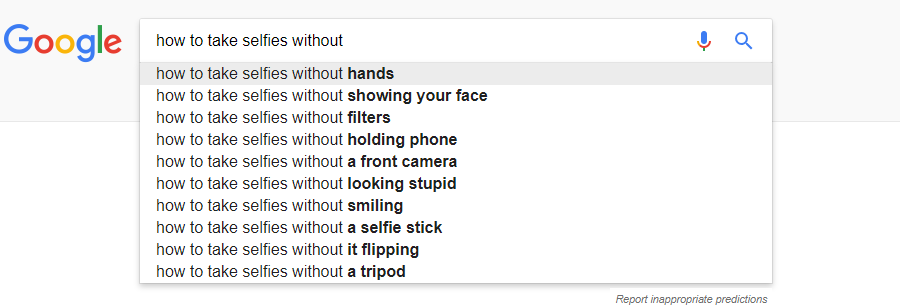
Next, scroll through the Top 10 results until you reach Related Searches. In that box, you’ll see more keyword variations, by which users can find your gadgets.

Swap Broad Keywords for Specific Phrases
Some of your prospects already know about your items and perform a search by their names. So besides how-to keywords, you can also use product terms like “selfie drones” for content optimization. But note that such phrases are too broad to compete with the big fish in your niche. You’ll have more chances to outplay them if you stick with specific phrasing.
For example, the term “selfie drone” can become more specific with different modifiers: features, size, price, device, etc. Your keyword generator may give you even more ideas related to your products.
| Features | waterproof selfie drone, foldable selfie drone, hover camera selfie drone, selfie drone 4k |
| Size | mini selfie drone, small selfie drone, micro foldable selfie drone, pocket-sized selfie drone |
| Device | iPhone selfie drone, smartphone selfie drone |
| Price | cheap selfie drone, best selfie drone under 100 |
| Status | top portable selfie drones, best selfie drone 2018, new selfie drone |
| Info Queries | how does a selfie drone work, things to look for when buying a selfie drone, how to remove a battery from selfie drone 7s |
The phrases listed in the table are called long-tail keywords. Taken separately, they usually get no more than a hundred monthly searches. But in total, they can bring you thousands of visits from organic search. As shown below, a single page can rank for multiple keywords.
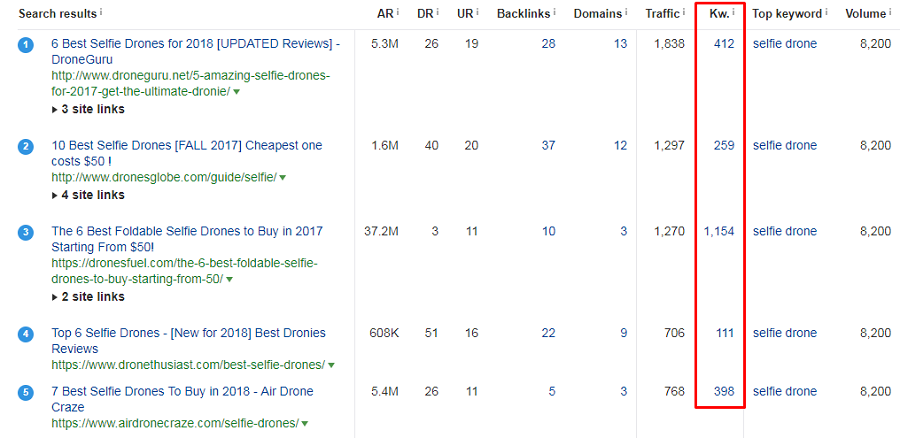
That’s because different searchers form their queries differently, be it a word choice or the entire structure, while their search intent remains the same. And Google understands it pretty well today, even without an exact match of the user’s query and the keyword in search results.
Here are the main things that don’t seem to influence Google’s ranking algorithm anymore.
Word Form Match
The engine treats different word forms equally, e.g. singular and plural in the case of nouns or infinitive and gerund in the case of verbs. For the query “making your own selfie drone,” search results contain the verb “make” used in its simple form rather than a gerund.
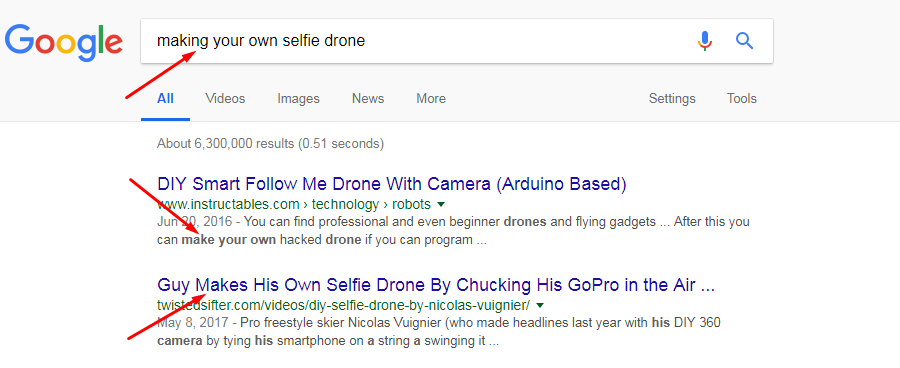
Query Structure Match
The query structure isn’t a big deal for Google either. Let’s analyze the first search results for the query “best drones for selfies.” The word “selfie” holds a different position, and there’s no preposition “for.”
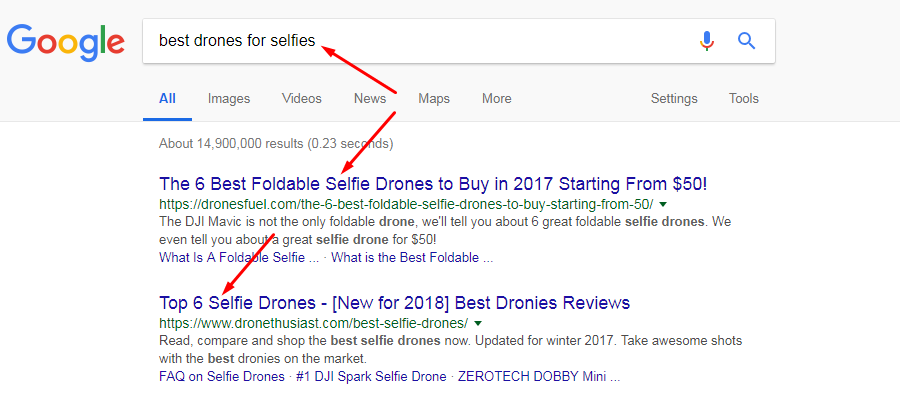
While such minor stuff matters for grammar, it can hardly make a difference in the phrase meaning. Logically, the engine skips it when analyzing queries.
Closely Related Phrases
Google has made significant progress in artificial intelligence lately. Not only does it understand synonyms, but also closely related phrases. For the query “inexpensive selfie drones,” the engine returns results optimized for “low-price,” “cheapest,” and “starting from $50.”
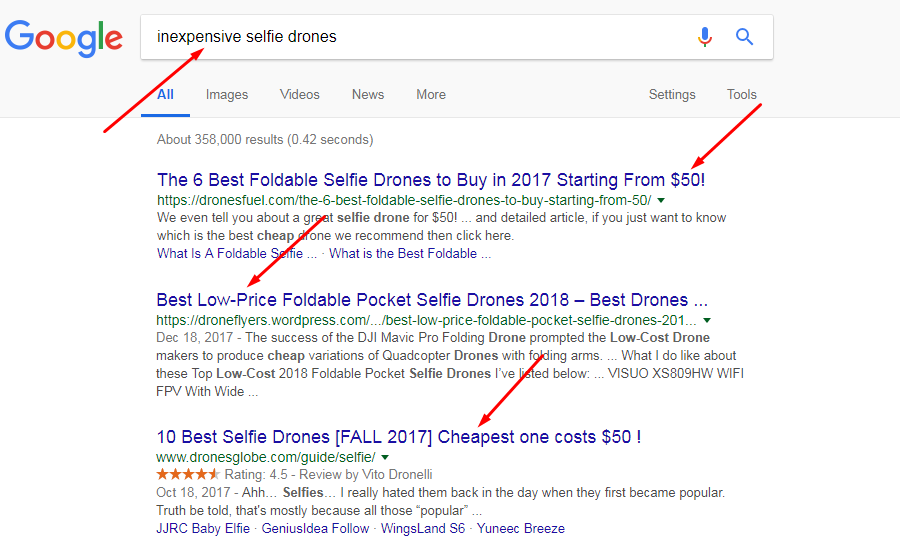
Grammatically, “starting from $50” isn’t a direct synonym to “inexpensive,” but Google knows that items priced at $50 aren’t expensive.
Analyze Crucial Keyword Metrics
While people mostly focus on the search volume, it’s not the alpha and omega of keyword research today. You’ll need to evaluate more metrics to understand if your keywords will pay off.
Keyword Difficulty
This metric reveals how difficult it is to reach the top using a target keyword. When you see a high difficulty score, you’ll need more backlinks from unique domains than the pages currently ranking in the Top 10. If there’s no way you can gain them, opt for keywords that are easier to rank for.
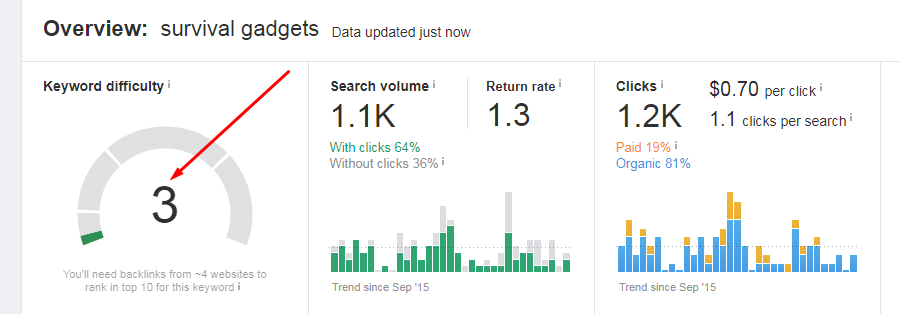
For example, “survival gadgets” has a low difficulty score of 3 points. It means you’ll be able to appear on the first page of SERP with backlinks from 4 domains only.
Clicks
While keywords with a high search volume look promising, they don’t necessarily bring the same amount of traffic. Most users never click through search results when there’s a ready answer above them. Let’s check the query “Apple founder.” It gets around 4.7K monthly searches, but 85% of them don’t convert into page visits.
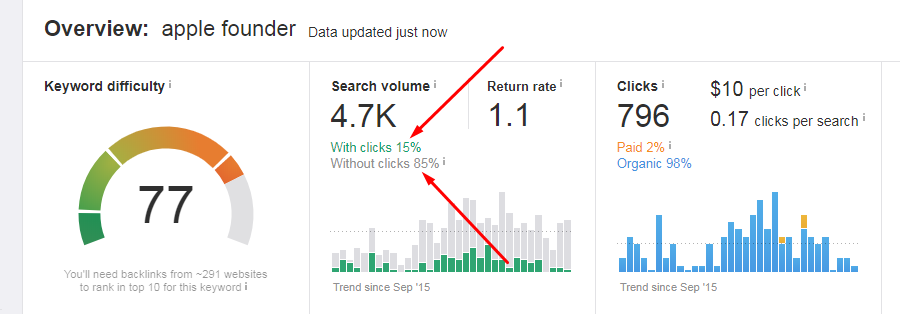
Here’s what happens. 85% of users type in this query, see an answer in Google’s Knowledge Card, and close the tab. They don’t need to click through organic results unless they want to check something specific about Apple founders. So, always make sure there’s no Knowledge Card or any other SERP feature for the chosen keyword.
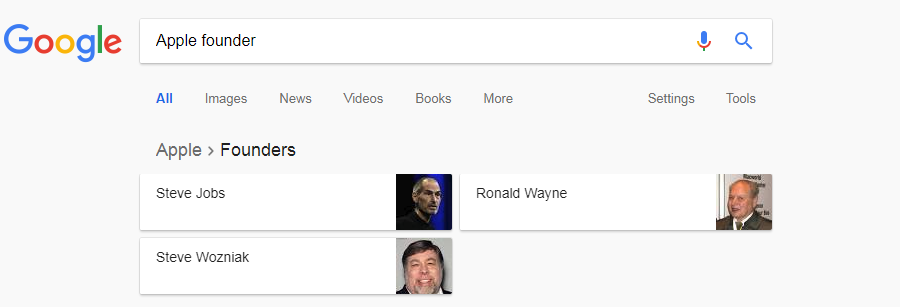
Seasonality
The next crucial metric to analyze is for how long your keyword is in demand during a year. The thing is some queries get many searches in high season and almost no searches for the rest of the time.
For example, the search demand for “Christmas gadgets” starts in early November, reaching its peak just a few days before Christmas. After the holiday, it drops sharply and stays at a record low until next November. To track your keyword seasonality, use Google Trends.
Optimize Your Copy for Competitors’ Keywords
A lot of your competitors have already found juicy keywords in your niche and get a constant flow of monthly traffic. The good news is you can drive some of it to your site using their profitable keywords. To identify them, use tools to check SERPs.
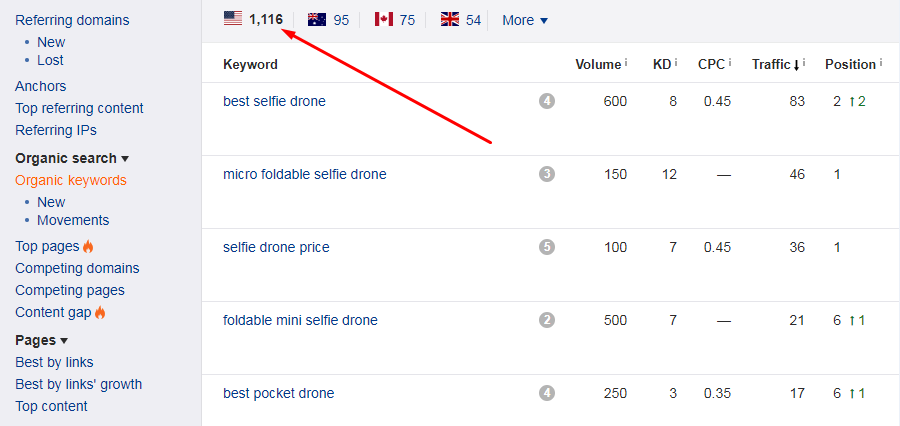
These tools will show you how many keywords each of the Top 10 pages ranks for and how many visits it gets per month. With a single click, you’ll be able to go through all the keywords one by one and filter them by various metrics – volume, difficulty, traffic, word count, etc. To start with the low hanging fruit, set a keyword difficulty score from 0 to 10.
Pick Keywords Based on Users’ Queries That Remain Unanswered
Have you set up a blog to keep customers up on your product updates and other big news in your niche? If you have, focus on topics that haven’t become a cliche yet. You can find fresh ideas in places where your target audience shares their issues – forums, Facebook groups, Quora, Reddit, etc.
When different forum members ask the same question, it may signal that they can’t find a clear answer in Google. This is your lucky chance to be the first and the only person providing a detailed piece of content on that topic. Not only will you attract new leads, but also prove your expertise.

Answer the Public can help you find tons of unique keywords. For a single word “drone,” this handy tool can suggest over 700 keywords grouped into five categories. They include questions, prepositional phrases, comparisons, alphabeticals, and related queries.
Click on a particular keyword to see how search results look for it. It will give you an idea if you can add new facts to the story or tell it in a new light.
Wrap-up
There’s no need to be a genius to pick profitable keywords for your product promotion. You must understand your target audience, Google algorithm, and a bunch of metrics. That’s all. Note that keyword optimization must go hand in hand with link building. It is your backlink profile that will prove your authority to Google. The more backlinks support your content, the higher it will deserve to rank.
If you need more tips on how to boost your ranking chances, watch this
detailed SEO tutorial.
Do you know any other keyword research tactics that proved to be efficient for you? Drop us a comment, please.
About the Author
Nick Campbell is a content marketer and outreach manager at Ahrefs. He is passionate about technology, SEO, and blogging trends. When Nick is not researching a new topic, he’s probably at some tech event.

